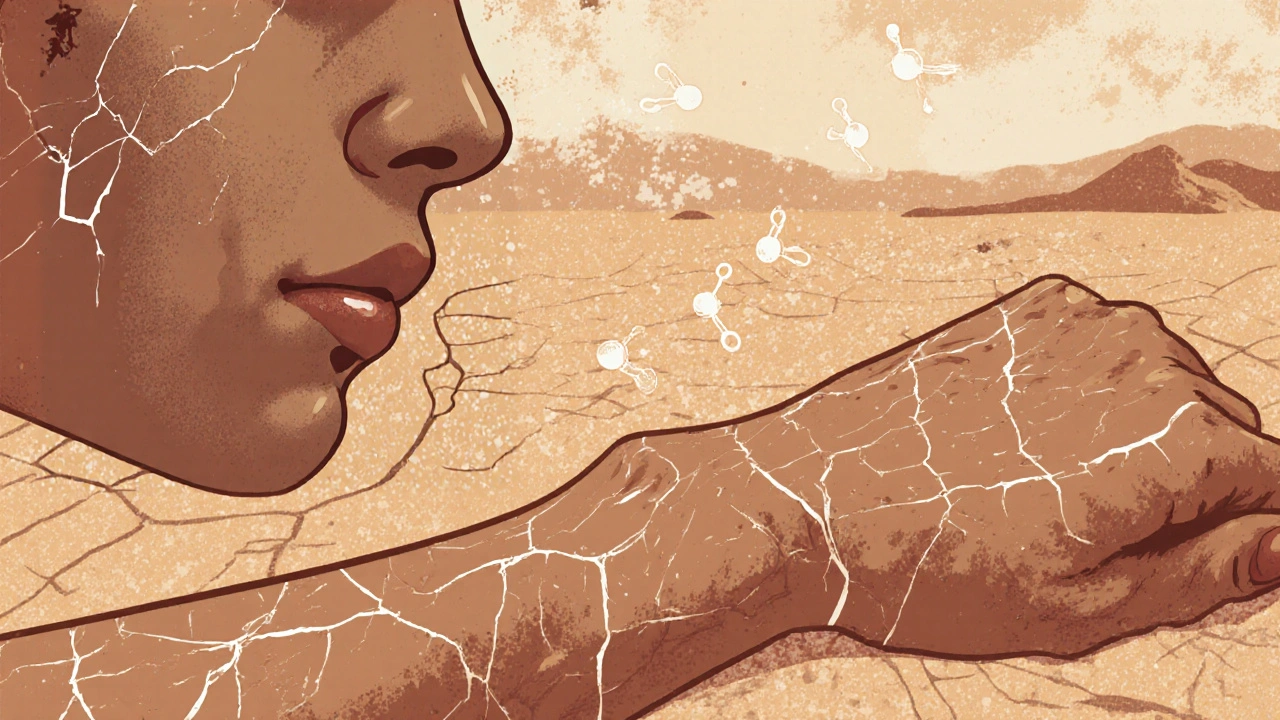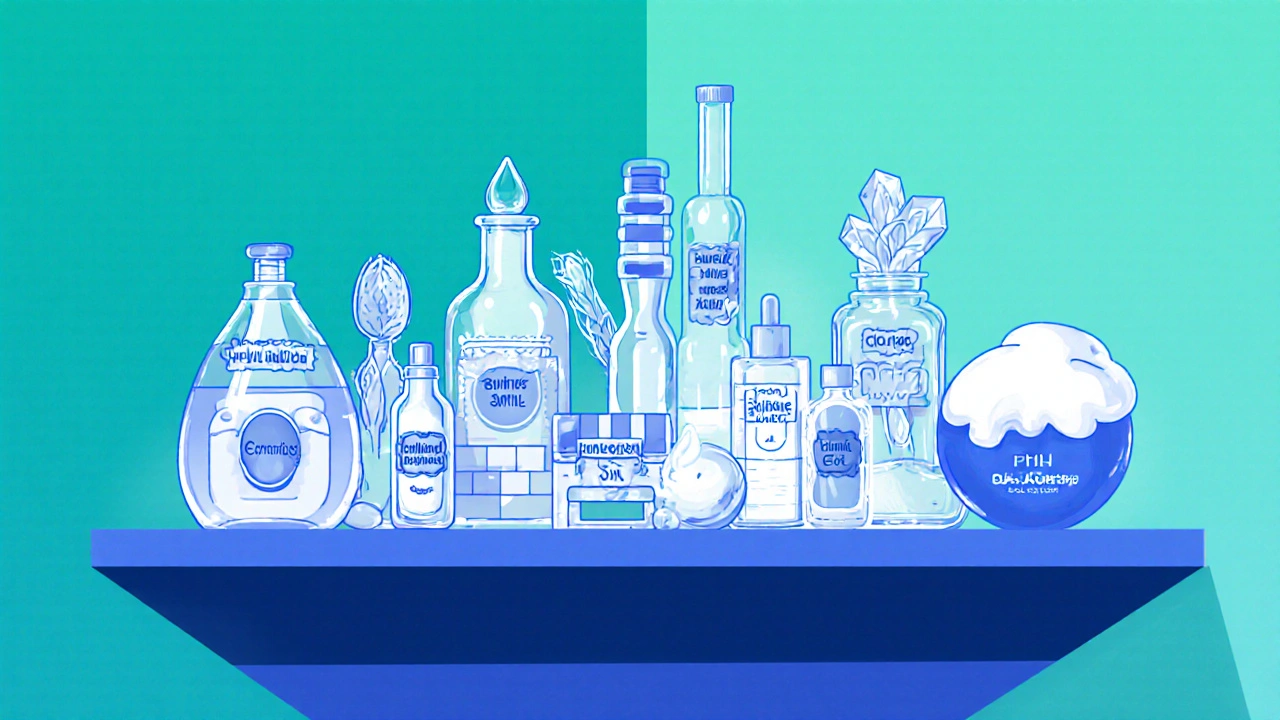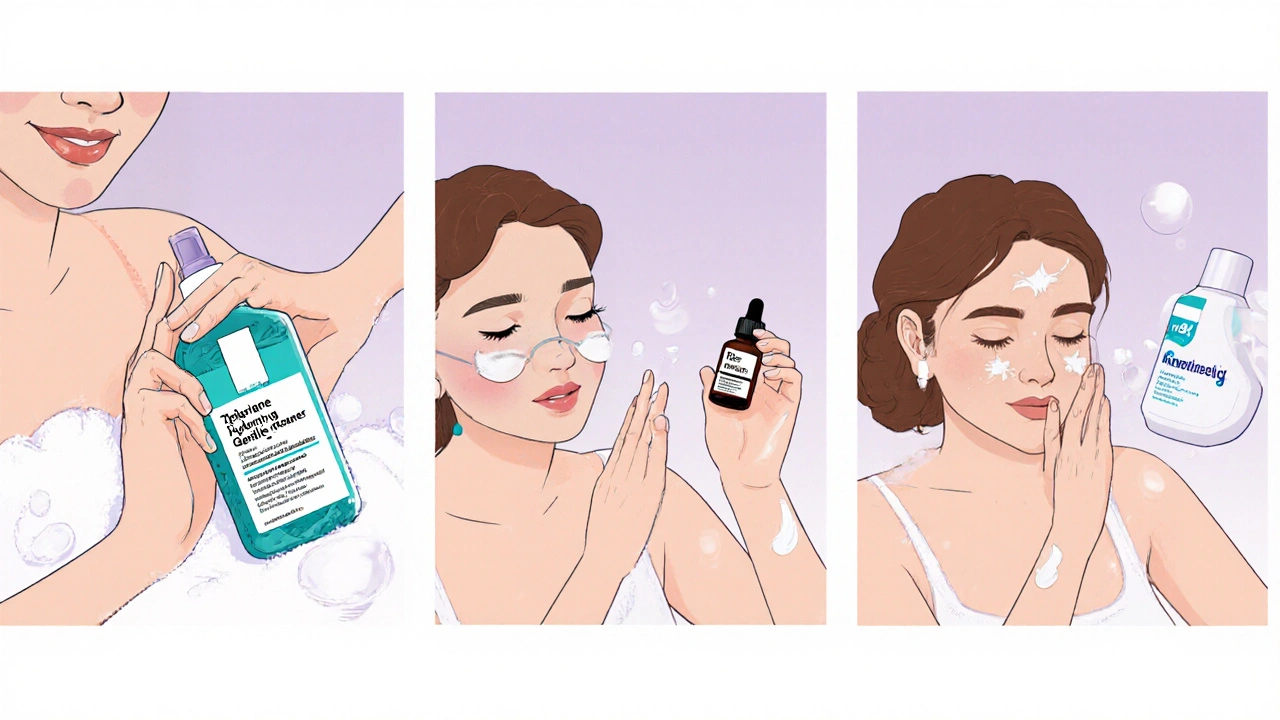
Dry Skin Product Selector
Select your primary dry skin concern to get personalized product recommendations for low estrogen-related dryness.
Select Your Symptom
Key Ingredients
Low estrogen dryness requires:
- Ceramides Barrier repair
- Hyaluronic Acid Deep hydration
- Urea Exfoliates & hydrates
- Colloidal Oatmeal Soothes inflammation
Recommended Product
Choose your symptom to see your personalized recommendation.
When estrogen levels drop, the skin can feel like a desert - tight, flaky, and constantly itching. Estrogen deficiency skin dryness is a condition where reduced hormone production weakens the skin’s natural barrier, leading to excessive transepidermal water loss and inflammation. Below, we walk through why this happens and which skincare products actually help restore comfort.
Why Low Estrogen Makes Your Skin Crave Moisture
Estrogen plays three big roles in skin health:
- Barrier reinforcement: It boosts production of lipids like ceramides that keep water locked in.
- Collagen synthesis: Less estrogen means thinner dermis, so the skin can’t retain moisture as well.
- Anti‑inflammatory effect: Estrogen modulates cytokines, so low levels increase itch‑triggering inflammation.
When the hormone dips - typically during menopause or after certain surgeries - the skin’s lipid matrix thins, the pH can rise, and itch receptors become hypersensitive. The result? Persistent dryness, redness, and that maddening urge to scratch.
Ingredients That Counteract Estrogen‑Related Dryness
Not every moisturizer is created equal. Look for these powerhouse components that directly address the deficits caused by low estrogen:
- Hyaluronic Acid - a humectant that draws up to 1,000 times its weight in water, replenishing lost hydration.
- Ceramides - lipid molecules that rebuild the barrier and lock moisture in.
- Urea - a natural keratolytic that softens rough patches while boosting water content.
- Colloidal Oatmeal - soothes irritation and calms inflammation.
- Shea Butter - an emollient rich in fatty acids that mimics skin’s own lipids.
- Vitamin E Oil - antioxidant that protects against oxidative stress linked to hormonal changes.
- Squalane - lightweight, non‑comedogenic lipid that restores flexibility without greasiness.
- pH‑balanced Cleanser - maintains the skin’s natural acid mantle (around pH 5.5) so moisturizers work better.
Top 5 Skincare Products for Relief
We tested dozens of options in Australian pharmacies and online stores. Here are the five that consistently delivered smoother, less itchy skin for women dealing with low estrogen.
- CeraVe Moisturizing Cream - features three essential ceramides and hyaluronic acid. Thick enough for night use, yet absorbs without a heavy film.
- Eucerin Advanced Repair Lotion - contains 5% urea and ceramide‑rich formula; great for rough elbows and shins.
- Aveeno Skin Relief Moisture Repair Cream - combines colloidal oatmeal with shea butter; ideal for calming post‑scratching redness.
- The Ordinary “Natural Moisturizing Factors + HA” - affordable serum packed with hyaluronic acid, amino acids, and squalane for a lightweight boost.
- La Roche‑Posay Toleriane Hydrating Gentle Cleanser - pH‑balanced, includes prebiotic thermal water and niacinamide to prep skin for moisturizers.

Side‑by‑Side Comparison
| Product | Main Hydrating Ingredient | Texture | Typical Price (AU$) | Best For |
|---|---|---|---|---|
| CeraVe Moisturizing Cream | Ceramides + Hyaluronic Acid | Rich cream | 45 | Night use, very dry patches |
| Eucerin Advanced Repair Lotion | Urea (5%) + Ceramides | Light lotion | 38 | Rough elbows/knees |
| Aveeno Skin Relief Moisture Repair Cream | Colloidal Oatmeal + Shea Butter | Thick but non‑greasy | 30 | Itchy, inflamed areas |
| The Ordinary “Natural Moisturizing Factors + HA” | Hyaluronic Acid + Squalane | Light serum | 12 | Layer under makeup |
| La Roche‑Posay Toleriane Hydrating Gentle Cleanser | Niacinamide + Prebiotic Water | Foaming gel | 28 | First‑step for sensitive skin |
How to Use These Products for Maximum Relief
- Cleanse gently. Start with the La Roche‑Posay Toleriane Cleanser. Apply with lukewarm water, avoiding hot showers that strip natural oils.
- Pat dry, don’t rub. Leaving a thin layer of moisture helps lock in water.
- Apply a hydrating serum. Use The Ordinary Natural Moisturizing Factors + HA while skin is still damp. This creates a moisture‑binding base.
- Seal the deal. Choose a cream or lotion based on the area:
- For the face and neck, CeraVe Moisturizing Cream works well overnight.
- For arms and legs, layer Eucerin Advanced Repair Lotion.
- For any itchy flare‑ups, smooth Aveeno Skin Relief Cream over the spot.
- Reapply as needed. In dry climates (like Sydney’s winter), a quick top‑up mid‑day keeps the barrier intact.

Common Mistakes and Pro Tips
Don’t over‑exfoliate. Scrubbing with harsh scrubs removes lipids you’re trying to replenish. Stick to chemical exfoliants like lactic acid no more than twice a week.
Avoid fragrance‑heavy formulas. Synthetic scents can aggravate itching. Choose fragrance‑free or naturally scented options (e.g., oat or chamomile).
Watch your diet. Omega‑3 rich foods (salmon, walnuts) support skin barrier function, complementing topical care.
Consider Hormone Replacement Therapy (HRT). While not a skincare product, HRT can restore estrogen levels, reducing the root cause of dryness. Talk to a GP about risks and benefits.
Stay hydrated. Internal hydration reflects on the skin; aim for at least 2 liters of water daily.
FAQ - Quick Answers to Your Burning Questions
Can I use these products if I’m on HRT?
Yes. Skincare and HRT work together - HRT tackles the hormonal cause while moisturizers handle the symptoms. Just keep an eye on any new sensitivities.
How often should I reapply moisturizer?
During menopause‑related dryness, twice a day (morning and night) is ideal. In colder months add a mid‑day boost for especially flaky areas.
Is urea safe for facial skin?
Yes, in concentrations under 10% it’s gentle and effective. Eucerin’s 5% formulation is skin‑friendly and non‑irritating.
Should I avoid retinoids while using these moisturizers?
Retinoids can exacerbate dryness. If you love retinoids, apply them on alternate nights and always follow with a barrier‑restoring cream like CeraVe.
Do natural oils like coconut oil help?
They can, but coconut oil is comedogenic for some skin types. For estrogen‑related dryness, choose non‑acnegenic lipids like squalane or shea butter.
Take charge of your skin today - pick the product that matches your specific itch or dryness zone, follow the simple routine, and you’ll notice relief within a week. Your skin will thank you, and you’ll feel more comfortable in every outfit, even those that show off your arms.
Margaret pope
Hey folks if you’re dealing with that tight itchy feeling the post mentions try layering a hyaluronic serum right after cleansing and then seal with a ceramide‑rich cream. Keep it consistent and you’ll notice the barrier getting stronger over a week. Also drinking enough water helps from the inside.
Karla Johnson
Low estrogen reshapes the skin’s landscape in ways many people overlook. The hormone normally fuels ceramide production, so when its level drops the lipid barrier weakens, allowing water to evaporate faster. That loss of barrier function explains the relentless tightness you feel after a shower. Inflammation follows because the skin’s immune sensors become overactive without estrogen’s calming influence. The result is not just dryness but also that maddening itch that drives you to scratch. To counteract this, look for moisturizers that supply the missing lipids directly; ceramides, squalane, and shea butter act as the building blocks the body can no longer provide efficiently. Hyaluronic acid, on the other hand, works as a humectant, pulling water from the environment into the stratum corneum. Urea adds a gentle keratolytic effect, smoothing rough patches while still boosting hydration. Colloidal oatmeal adds an anti‑inflammatory shield that soothes the itch receptors. Applying a pH‑balanced cleanser first preserves the skin’s acid mantle, ensuring the subsequent moisturizers are absorbed properly. Nighttime is the optimal window for richer creams such as CeraVe Moisturizing Cream because the skin’s repair processes peak while you sleep. For daytime, a lighter serum like The Ordinary Natural Moisturizing Factors keeps the barrier topped up without feeling greasy under makeup. In colder climates, a mid‑day top‑up can prevent the barrier from cracking under low humidity. Remember, topical care works best when paired with internal support: omega‑3 rich foods, adequate water intake, and, where appropriate, hormone replacement therapy. Finally, avoid aggressive exfoliation; a couple of gentle lactic acid applications per week are enough to keep cells turning over without stripping away precious lipids.
Linda A
Your words echo the silent desert within our skin, a landscape yearning for rain. In that arid expanse, the tiniest drop of ceramide feels like a miracle. May we all find the oasis of comfort.
Joe Moore
Yo i read that big pharma pushin' these creams just to keep us buyin nonstop.
they slap a fancy label on ceramides but the real fix is gettin' real estrogen back.
dont trust the hype just slap some oat oatmeal on it.
Ayla Stewart
I appreciate the clear routine steps. Using a gentle cleanser before moisturising is a sensible approach. The product list seems balanced for different skin areas.
Stephanie Zaragoza
Honestly, the regimen described, while comprehensive, suffers from an over‑reliance on synthetic formulations, which, in my opinion, could be mitigated by incorporating more natural alternatives; additionally, the frequency of application, twice daily, may be excessive for sensitive individuals; furthermore, the suggestion to combine retinoids with barrier‑repair creams should be approached with caution, as the irritation potential remains significant; overall, a more nuanced personalization would enhance efficacy.
James Mali
Sounds like a textbook lecture, not a real‑world plan 🙂.
Janet Morales
Your skin will thank you for finally listening.





![Capoten (Captopril): Official Info, Uses, Dosage, Side Effects, Warnings [2025]](/uploads/2025/08/thumbnail-capoten-captopril-official-info-uses-dosage-side-effects-warnings.webp)
Write a comment